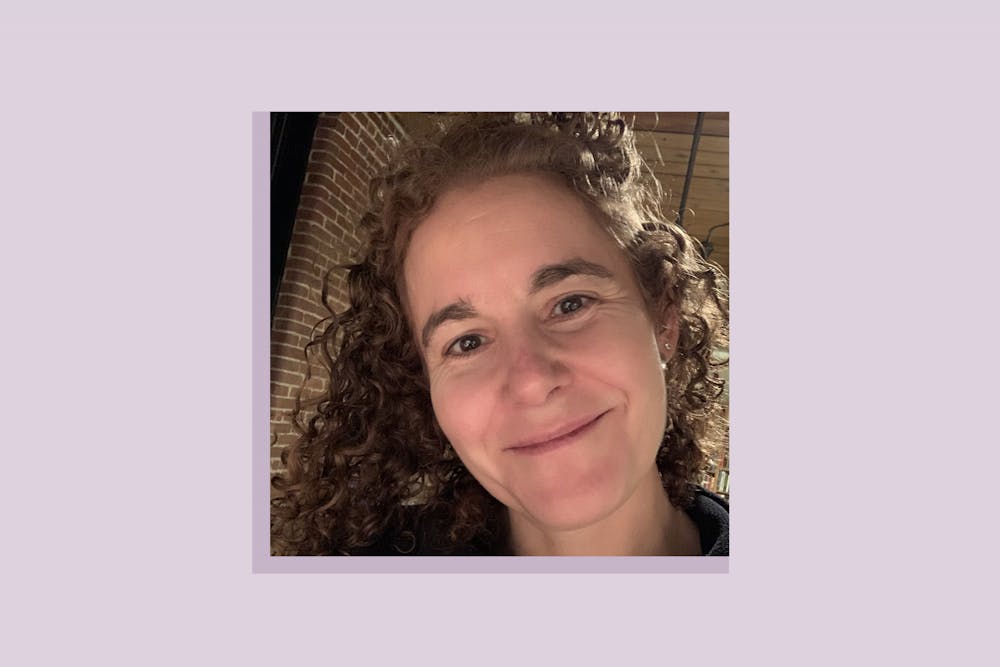You can’t miss her.
With an “atrociously ugly” lime green baseball hat atop her head and a notebook and pen in hand, you might spot Professor Anne Berg taking notes on the fringes of a protest.
The hat signals to everyone around that she’s not here to participate, but rather to volunteer and protect as a legal observer.
“Our role is not to defend or report anything,” Berg says. “We are there to protect the First Amendment—to make sure that people’s right to express their views, to protest, to assemble are respected and that nobody interferes with that.”
Berg works with the Philadelphia Chapter of the National Lawyers Guild, a progressive bar association that works with protest organizers to send legal observers to take note of anything that might occur at a protest. Legal observers take photos, video footage, or notes of the protest and upload those to the NLG’s Dropbox folder. No one will have access to any of the information unless a case opens. “In case there are altercations, there’s an objective neutral record, so that it’s not your word against somebody else’s word,” Berg says. “We make sure that there is context provided.”
She completed her mandatory training in early June after hearing about the organization from several friends who are involved. She's since attended countless protests as a legal observer. “I don’t even know [how many],” she laughs, shaking her head. “A lot.” Most weeks she goes to one or two protests, but sometimes she attends more.
As a historian, Berg appreciates the perspective that being a legal observer allows her. “This is a way that I can put the skills I have to great use,” she says. “It’s also very interesting for me as a historian of the present to get a sense of the various dynamics. It’s always easier to understand what’s going on when you’re slightly removed.”
Having experienced protests from two perspectives, that of a participant and that of a legal observer, Berg has observed one main thing: “When things escalate, it is usually the police that escalate things, rather than the protesters. And that is a pattern that I think is confirmed by the interactions that people have with police—especially in recent months—everywhere in the U.S.” It’s something she’s seen written about by historians, something she’s seen personally, and something she’s written about herself.
Whereas other legal observers may take photographs or video, Berg uses a different approach. Standing on the outside somewhere that is “as close to the action as is safe,” she might take a photo or video here and there for her own memory, but for the most part, she relies on her longhand notes.
“In the end, the photos all look the same, and it’s difficult to put them together with your timestamps and things like that,” Berg says. “For me, it’s easier to rely on notes. You can write down things that are happening in different places at the same time, whereas your camera is always pointed in one direction. You’re less constricted by the frame of your lens."
As she takes her notes, Berg looks for two things: what’s happening and what’s not happening. “Sometimes nothing happening is just as important—or more important—than something happening,” she says. “If somebody will later on claim that there was a riotous situation but you have five legal observers who noted that nothing happened … that can be really important information.”
While many regular protestors recognize her and other legal observers, sometimes participants find her suspicious, questioning her presence and note–taking. “[After I explain], that’s usually something that people appreciate once they understand what it is that we’re doing,” Berg says.
So if you see someone with a bright green hat at a protest, know that you can trust them. “I think it’s important for people to know that if we come with our green hats, we are there to protect ... I just want people to know that we’re there,” she says. “This is a service to the functioning of democracy, especially now … It’s an attempt to not reinforce power where it already rests, but to create resources for those who could potentially find themselves in a position of disempowerment.”

